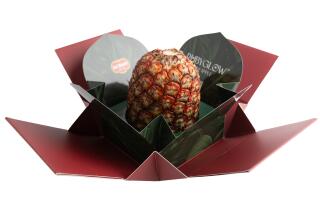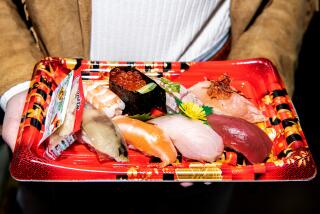Apples Grown in Japan Being Sold in U.S. Stores for First Time in History : Agriculture: Quiet arrival of Fujis hailed as symbolic victory with minimal market impact.
- Share via
For the first time ever, shoppers in America now can purchase a plump, pink piece of history--an apple grown in Japan.
But the arrival here last week of high-priced Fuji apples from Aomori prefecture, the preeminent apple-growing region in northern Japan, drew little attention outside of the local Asian-language media.
The understated debut of the Japanese-grown apples in Yaohan supermarkets in Los Angeles, Chicago and New York was a stark contrast to the extensive attention given the first shipments of U.S. apples to Japan earlier this year.
The trade deal ended a contentious 24-year battle by U.S. apple growers to get into the Japanese market. It set off such a frenzy that NHK, Japan’s national television network, broke into its regular morning program to announce the arrival in January of the Red and Golden Delicious apples at the docks.
The appearance of Fuji apples in the United States came without the same hoopla largely because the impact on the U.S. market will be relatively small. While U.S. apple growers expect Japanese consumers to buy up to 42,000 tons of U.S. apples annually, Japanese growers will ship just 15 tons of the “gift quality” Fuji apples to the United States in 1995.
But for the Japanese--stung by international criticism and fearful of the impact of an invasion of low-priced foreign produce on their own turf--the shipment of apples to the United States represents a symbolic victory.
Jun Koda, an agriculture specialist in the Japanese consulate in Los Angeles, said Japanese farmers are anxious to increase their exports to the United States to offset the much larger flow of U.S. agricultural products to Japan. He is confident there is a good market for the Japanese apples in the United States.
“I think the quality (of Japanese apples) is much better than American ones,” Koda said.
Yaohan USA Corp., the exclusive distributor of the Japanese apples, is initially targeting recent arrivals from Asia willing to pay big bucks for a piece of fruit grown inside a tiny bag to protect it from bugs and weather.
Frank Maruyama, the produce buyer for Yaohan’s nine U.S. supermarkets, said the young Japanese businessmen stationed in the United States do not blink at paying astronomical prices for fresh fruit.
In the first four days, Yaohan sold 800 cases of the Japanese apples at $3.99 a pound, more than twice the price of the U.S.-grown Fujis. Most of the sales were at the Japanese chain’s Little Tokyo store in Los Angeles, where the apples will be on sale for a month.
Sandy Chao of San Gabriel developed a liking for the Japanese apples in Taiwan. On her last visit to Yaohan, she purchased four of the large, perfectly round apples for her son.
“The taste is very good,” she said. “The skin is thin and the apple is soft.”
U.S. apple growers, elated at their success in Japan and other Asian markets, aren’t worried about the new foreign competition. They said the U.S.-grown Fuji apples are much cheaper and will appeal to a different clientele than the imported variety.
“Theirs is a different commodity and it’s something we haven’t been able to produce yet,” said Michael Collins, marketing director at Sierra Hills Packing, one of the largest Fuji apple grower-shippers in California. “If they have a market for it and if they can get the return that they need, then I think it’s fair.”
Collins said California’s growers have not applied for permission to export apples to Japan, a costly and lengthy process. He expects that to take place in a year or two.
Meanwhile, Washington apple growers are enjoying a warm reception in Japan, where they have sold 9,450 tons since Jan. 9. Their apples sell for 50 to 75 cents apiece in Tokyo, at least 30% less than their Japanese competitors.
“The Japanese growers are hoping to carve a niche in the United States on what they do best and we’re hoping to do the same in Japan,” said Jim Thomas, spokesman for the Washington Apple Commission.
More to Read
Inside the business of entertainment
The Wide Shot brings you news, analysis and insights on everything from streaming wars to production — and what it all means for the future.
You may occasionally receive promotional content from the Los Angeles Times.










